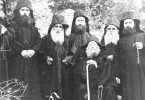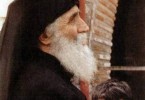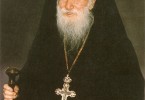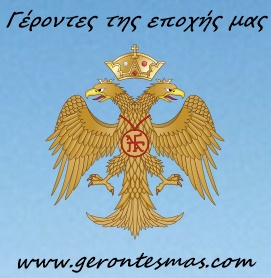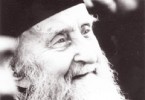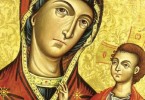 Γεννήθηκε στην Δρούσια, ένα μικρό χωριό της επαρχίας Πάφου της νήσου των Αγίων, την 1η Ιουλίου 1921. Η μητέρα του Ευγενία γέννησε όταν ήταν εφτά μηνών το μικρό παιδί της στο μοναστήρι των Αγίων Αναργύρων της Γιόλου, την ημέρα της εορτής των Αγίων. Η μητέρα του νόμισε ότι το παιδί ήταν νεκρό, και όμως έζησε. Το βρέφος έλαβε κατά την βάπτιση το όνομα Σωκράτης.
Γεννήθηκε στην Δρούσια, ένα μικρό χωριό της επαρχίας Πάφου της νήσου των Αγίων, την 1η Ιουλίου 1921. Η μητέρα του Ευγενία γέννησε όταν ήταν εφτά μηνών το μικρό παιδί της στο μοναστήρι των Αγίων Αναργύρων της Γιόλου, την ημέρα της εορτής των Αγίων. Η μητέρα του νόμισε ότι το παιδί ήταν νεκρό, και όμως έζησε. Το βρέφος έλαβε κατά την βάπτιση το όνομα Σωκράτης.
Ο μικρός Σωκράτης μεγάλωσε κοντά στους αγρότες γονείς του ζώντας από μικρός την σκληρή ζωή. Μόλις κατόρθωσε να τελειώσει την τετάρτη τάξη του Δημοτικού, γιατί ήταν απαραίτητος στις αγροτικές εργασίες. Μέχρι τα δεκαπέντε του χρόνια παρέμενε στο χωριό του.
Το 1936 μετά από θεϊκή κλήση προσήλθε στην Ιερά Μονή Σταυροβουνίου με τις ευχές των γονέων του. Εκεί εκάρη ρασοφόρος μοναχός με το όνομα Σωφρόνιος. Παρέμεινε 10 χρόνια στην Μονή και με την παρότρυνση και ευλογία του Γέροντος Κυπριανού, πνευματικού της Μονής, εγκαταβίωσε στο Άγιον Όρος μετά από μία σύντομη επίσκεψη στους Αγίους Τόπους.
Αρχές του 1947 βρίσκεται στην Σκήτη της Αγίας Αννης σε κάποιους συμπατριώτες του που μόναζαν εκεί, ενώ το καλοκαίρι του ίδιου έτους γνωρίζεται με τον μακάριο Γέροντα Ιωσήφ τον Ησυχαστή. Ο μοναχός Σωφρόνιος κατάλαβε την πνευματικότητα και την αγιότητα του Γέροντος Ιωσήφ του Ησυχαστού και τον παρακάλεσε να γίνει υποτακτικός του. Ο μακάριος Γέροντας στην αρχή αρνήθηκε, αλλά μετά από «πληροφορία» που έλαβε, τον δέχθηκε στην συνοδεία του.
Εκεί στην καλύβη του Τιμίου Προδρόμου της Μικρής Αγίας Αννης εκάρη μεγαλόσχημος λαμβάνοντας το όνομα Ιωσήφ το Σάββατο του Λαζάρου (11/24 Απριλίου) του 1948. Το 1951 η συνοδεία μεταφέρθηκε στα ησυχαστικά κελλιά της Νέας Σκήτης κοντά στον Πύργο. Ο μακάριος Γέροντας Ιωσήφ ο Ησυχαστής κοιμήθηκε οσιακώς την ημέρα της Κοιμήσεως της Θεοτόκου το 1959. Ο αείμνηστος Γέροντας Ιωσήφ ικανοποίησε τον βαθύτατο πόθο της ψυχής του κοντά στον μεγάλο Γέροντα Ιωσήφ τον Ησυχαστή.
Ο Γέροντας Ιωσήφ συνασκήθηκε με τον π. Θεοφύλακτο στο κελλί των Αγίων Αναργύρων της Νέας Σκήτης από το 1951 ως το 1959. Κατόπιν μεταφέρθηκε στο ερημικό τμήμα της Νέας Σκήτης όπου οικοδόμησε με τα χέρια του μια ξηροκαλύβα όπου ασκήθηκε άλλα οκτώ χρόνια και το 1967 μετοίκισε στην κοντική καλύβη του Ευαγγελισμού της Θεοτόκου, από την οποία είχε αναχωρήσει ο παραδελφός του Γέροντας Εφραίμ (μετέπειτα ηγούμενος Ι. Μ. Φιλοθέου) με την συνοδεία του για να μείνουν στο κελλί του Αγίου Αρτεμίου στην Προβάτα.
Μετά από πρόσκληση του Οικουμενικού Πατριάρχη κυρού Δημητρίου και προτροπή των πατέρων της Ιεράς Μονής Κουτλουμουσίου ο Γέροντας Ιωσήφ έφυγε από την Νέα Σκήτη τον Μάϊο του 1975 και ανέλαβε την πνευματική πατρότητα της Μονής, στην οποία παρέμεινε μέχρι το 1977.
Στην συνέχεια μετέβη στην Κύπρο μετά από συμβουλή του μακαρίου Γέροντος Παϊσίου και εγκαταβίωσε στην Ιερά Μονή Τιμίου Σταυρού Μίνθης. Την 25η Μαρτίου του 1978 ενεθρονίσθη ηγούμενος. Εδώ συγκαταριθμήθηκαν στην συνοδεία του ο νυν μητροπολίτης Λεμεσού κ. Αθανάσιος και ο Καθηγούμενος της Μονής Βατοπαιδίου Γέροντας Εφραίμ.
Στις 26 Οκτωβρίου του 1981 επιστρέφει στο Άγιον Όρος μαζί με την συνοδεία του και παραμένει στο Σιμωνοπετρίτικο κελλί του Ευαγγελισμού της Θεοτόκου στην Καψάλα μέχρι τις 23 Απριλίου 1982, που μεταβαίνει και πάλι στην Ιερά Μονή Κουτλουμουσίου. Τον Αύγουστο του 1983 εγκαταβιώνει ξανά στην καλύβη του Ευαγγελισμού της Θεοτόκου στην Νέα Σκήτη. Εκεί αυξάνεται η συνοδεία του και στις 23 Απριλίου του 1987 κατόπιν προσκλήσεως των Γερόντων της Ιεράς Μονής Βατοπαιδίου έρχεται στην Μονή με ένα μέρος της συνοδείας του. Τον Οκτώβριο του 1989 το Οικουμενικό Πατριαρχείο αποφάσισε να μεταβεί όλη η συνοδεία στην Μονή για να παραλάβει την διοίκησή της. Στις 16/29 Απριλίου του 1990 γίνεται η κοινοβιοποίηση της Μονής και η εκλογή και ενθρόνιση του πρώτου ηγουμένου του Κοινοβίου, αρχιμανδρίτου Εφραίμ. Ο Γέροντας Ιωσήφ ήταν και παρέμεινε ο πνευματικός πατέρας της Μονής Βατοπαιδίου μέχρι και την κοίμησή του, που συνέβη την 1 Ιουλίου 2009.
Ο Γέροντας Ιωσήφ συνέχισε την πνευματική εργασία που παρέλαβε από τον Γέροντά του, έζησε μέχρι το τέλος της ζωής του ως ησυχαστής. Επεδίωκε την αφάνεια. Δεν ζήτησε ανθρωπίνους επαίνους και δόξες. Δεχόταν με ταπείνωση, ανεξικακία και χωρίς γογγυσμό την περιφρόνηση, την καταφρόνηση, την εξουθένωση, τις κατηγορίες, τις συκοφαντίες. Είχε «σπλάχνα οικτιρμών» και η καρδιά του χωρούσε και συγ-χωρούσε όλους, διότι είχε χωρέσει μέσα του τον Χριστό.
Στα δεκαέξι βιβλία του, που μας άφησε ως πνευματική κληρονομιά, καταγράφει και ερμηνεύει θέματα «πράξεως και θεωρίας». Προσπαθεί να οδηγήσει μοναχούς και λαϊκούς προς τον Χριστό και τους εμπνέει στον «καλόν αγώνα». Ιδιαίτερα τόνιζε το άπειρο πέλαγος της φιλανθρωπίας και φιλευσπλαγχνίας του Θεού, ο οποίος δέχεται τον μετανοούντα και επιστρέφοντα αμαρτωλό. Φανερώνει τους κινδύνους της πλάνης του βασικού και αιωνίου εχθρού του ανθρώπου, του διαβόλου, ιδιαίτερα δε κτυπά την αποθάρρυνση που στις ημέρες μας χρησιμοποιείται από αυτόν. Μιλούσε δε με πόθο για τις επαγγελίες του Θεού, για την υιοθεσία και τον θεανθρωπισμό που αρχίζουν οι «βεβαιόπιστοι» να γεύονται μέν από την παρούσα ζωή, αλλά το πλήρωμά τους θα τους δοθεί στα έσχατα.
Αυτά τα επουράνια αγαθά, τα οποία όπως λέει ο απόστολος Παύλος, «οφθαλμός ουκ είδε και ούς ουκ ήκουσε και επί καρδίαν ανθρώπου ουκ ανέβη, ά ητοίμασεν ο Θεός τοίς αγαπώσιν αυτόν» (Α΄ Κορ. 2, 9) απολαμβάνει τώρα ο μακάριος Γέροντας.
Elder Joseph, insignificant according to the world, was born in Drousia, a small village in the district of Paphos on the island of Saints [Cyprus], on July 1st 1921. His mother Evgenia gave birth to her little child when she was seven months pregnant at the Monastery of the Holy Unmerceneries in Giolou on the feastday of these Saints. The mother thought the child had died, yet he lived. The infant received the name Socrates upon being baptized.
Little Socrates was closely raised by his peasant parents living from a young age the hard life. When he succeeded in finishing the fourth grade of Elementary School, he was needed to do field work. Until he was fifteen years old he remained in his village.
In 1936 he followed a divine calling and entered the Sacred Monastery of Stavrovouniou with the blessing of his parents. There he was tonsured a rasophoros monk and given the name Sophronios. He lived ten years in the Monastery and with the urging and blessing of Elder Kyprianos [Cyprian], spiritual father of the Monastery, he departed for the Holy Mountain after a brief visit to the Holy Land.
In the beginning of 1947 he entered the Skete of Saint Anna with certain compatriots who were living the monastic life there, but in the summer of the same year he met with the blessed Elder Joseph the Hesychast. Monk Sophronios understood the spirituality and holiness of Elder Joseph the Hesychast and requested to become his novice. The blessed Elder in the beginning denied his request, but after he received a “notice”, he allowed him into his brotherhood.
There in the kalyva of the Precious Forerunner of Saint Anna’s he was tonsured with the Great Schema and received the name Joseph on the Saturday of Lazarus (April 11/24) in 1948. In 1951 the brotherhood moved to the hesychastic cells of New Skete near Pyrgos. The blessed Elder Joseph the Hesychast fell asleep in holiness on the day of the Dormition of the Theotokos in 1959. Our ever-memorable Elder Joseph satisfied the deepest desires of his soul near the great Elder Joseph.
Elder Joseph lived co-ascetically with Fr. Theophylaktos in the cell of the Holy Unmerceneries of New Skete from 1951 until 1959. Afterwards they moved to the abandoned section of New Skete where he built with his own hands a wooden kalyva where he lived in asceticism another eight years; and in 1967 he moved to the neighboring kalyva of the Annunciation of the Theotokos from which his spiritual brother Elder Ephraim (who became abbot of the Sacred Monastery of Philotheou) along with his brotherhood departed to live in the cell of Saint Artemios in Provata.
At the invitation of Ecumenical Patriarch Demetrios and the exhortation of the fathers of the Sacred Monastery of Koutloumousiou Elder Joseph left New Skete in 1975 and became spiritual father of the Monastery until 1977.
After receiving advice from the blessed Elder Paisios he moved to Cyprus and lived in the Sacred Monastery of the Precious Cross in Minthis. On March 25, 1978 he was enthroned as abbot. There he gathered into his brotherhood the now Metropolitan of Limassol Athanasios and the Abbot of Monastery Vatopaidi Elder Ephraim.
On October 26, 1981 he returned to Mount Athos with his brotherhood and lived in the Simonopetrite cell of the Annunciation of the Theotokos in Kapsala until April 23, 1982, at which time he moved again to the Sacred Monastery of Koutloumousiou. In August of 1983 he lived again in the kalyva of the Annunciation of the Theotokos at New Skete. There his brotherhood grew and on April 23, 1987 at the invitation of the Elders of the Sacred Monastery of Vatopaidi he came to the Monastery with a portion of his brotherhood. In October of 1989 the Ecumenical Patriarchate decided to move the entire brotherhood to the Monastery to receive its governance. On April 16/29, 1990 the creation of the Coenobium took place as well as the choosing and enthronement of the first abbot of the Coenobium, Archimandrite Ephraim. Elder Joseph was and remained the spiritual father of Vatopaidi Monastery until his falling asleep, which occurred on July 1, 2009.
Elder Joseph continued the spiritual work which he received from his Elder, and lived as a hesychast till the end of his life. He sought obscurity. He did not seek worldly praise or glory. He endured humbly, meekly and without grumbling all scorn, contempt, disgrace, criticism and slander. He had “compassionate pity” and his heart received and forgave all, because he gave room within himself for Christ.
In his sixteen books, which he left us as a spiritual inheritance, he wrote on and interpreted issues relating to “praxis and theoria”. He tried to lead monks and laity to Christ and inspired them in the “good fight”. He especially emphasized the infinite ocean of God’s love and compassion for mankind, who receives the repentant and returning sinner. He uncovered the dangers and deceptions of the eternal enemy of mankind, the devil, especially hitting on the discouragement which in our days comes from him. He spoke with passion about the promises of God, about sonship and deification which those of “sure faith” desire from this present life, but the fullness of which will be given in eternity.
These heavenly goods, of which the Apostle Paul says: “Eye has not seen, nor ear heard, nor have entered into the heart of man the things which God has prepared for those who love Him” (2 Cor. 2:9), we have the assurance that the blessed Elder is now a recepient.

